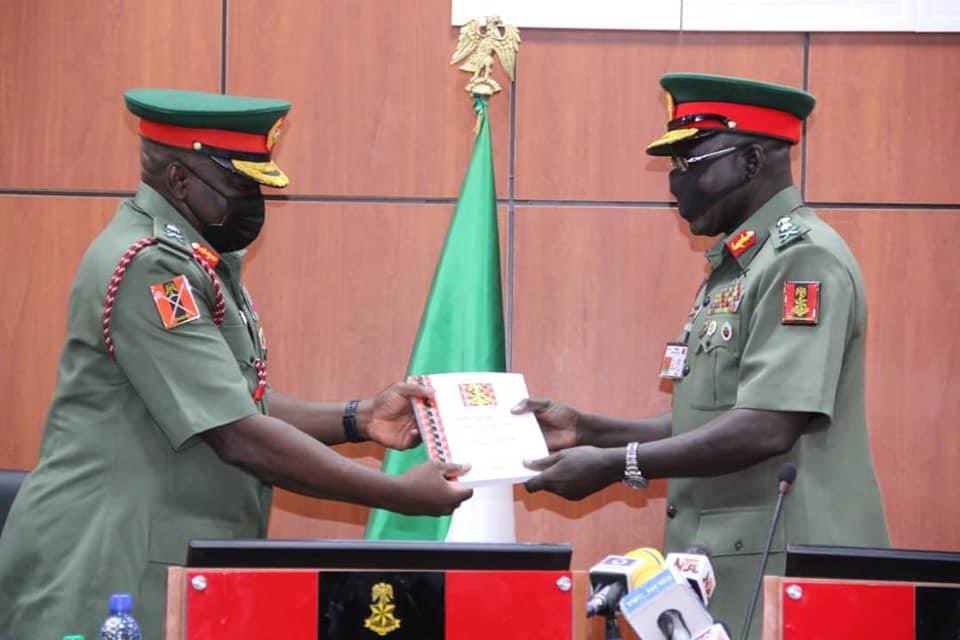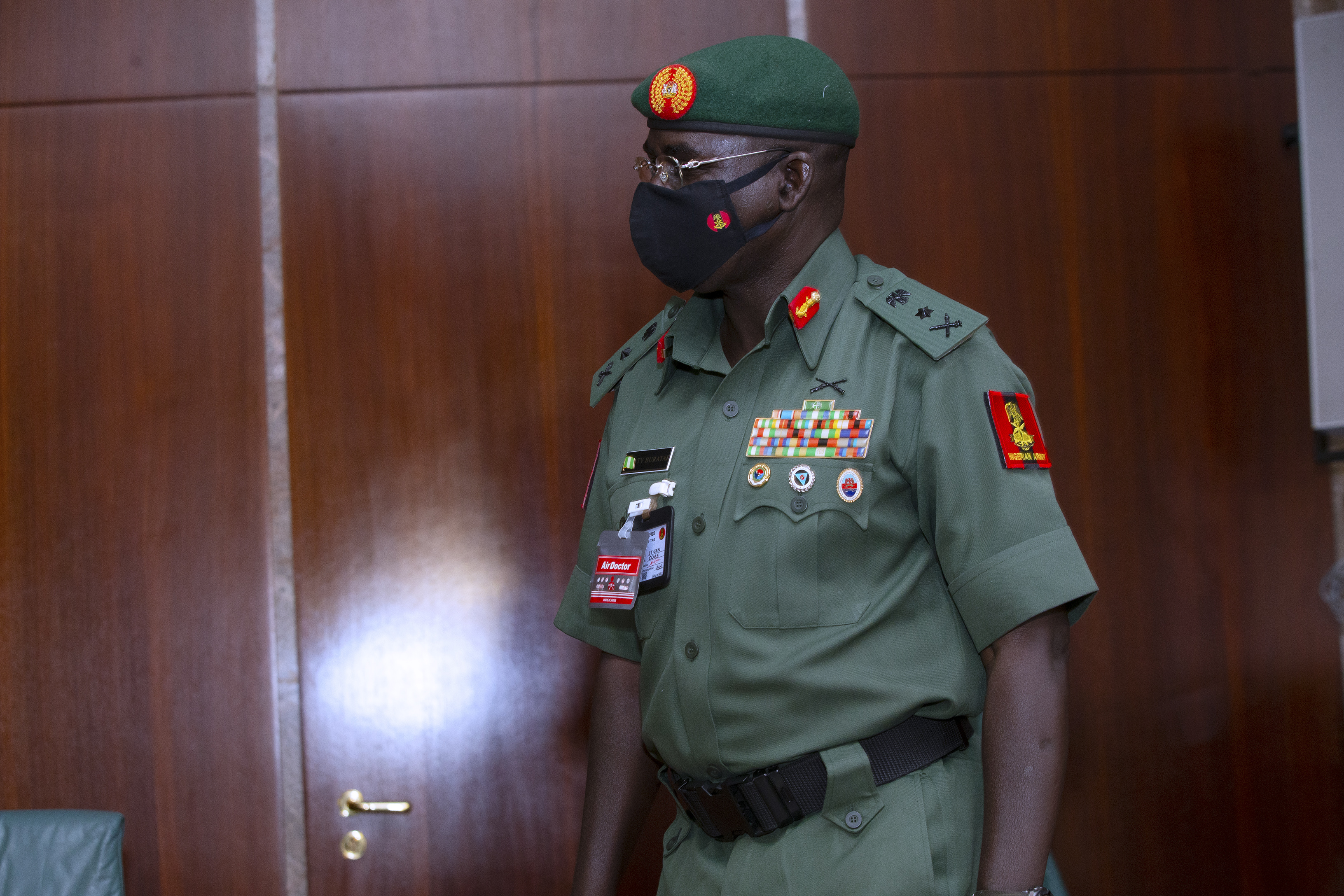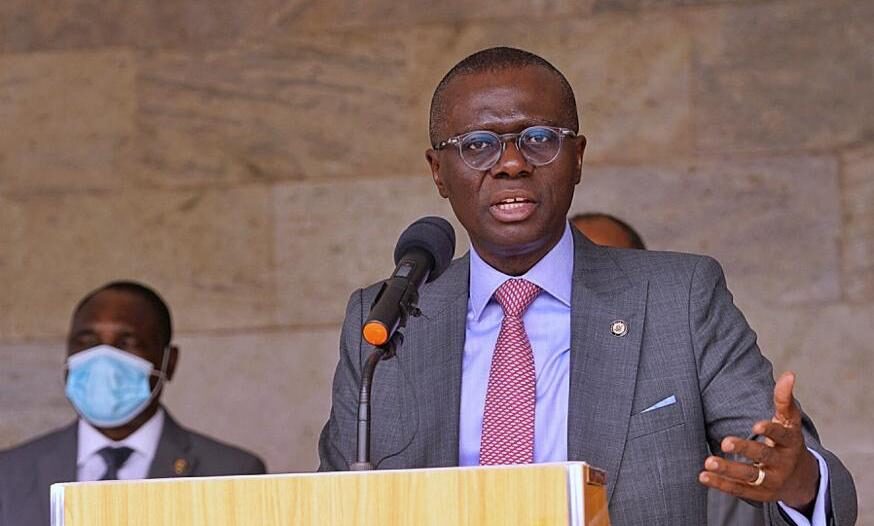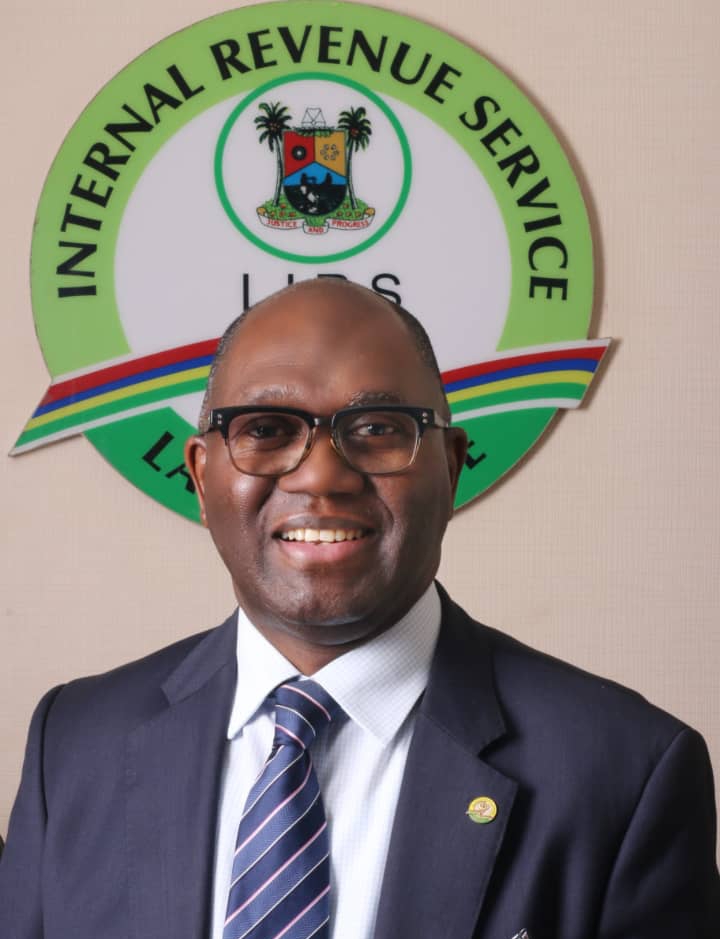BY NAOMI MICHAEL
The recent appointment of new Service Chiefs by President Muhammadu Buhari has opened a new vista in the country’s security architecture. In his remark, the President thanked the outgoing Service Chiefs for their efforts and commitment during their stint in office that yielded innumerable gains.
I cannot but agree with the President because he remains the Commander-in-Chief of the Armed Forces of the Federal Republic of Nigeria. In that capacity, his verdict can be trusted with regards the scorecard of the outgoing Service Chiefs.
There is a famous saying of Soldier come, and Soldier go, but the barrack remains. This is my summation regarding the new appointments, which is customary the world over, Nigeria inclusive. However, it is always expected that whenever there is a change of baton, it also comes with the burden of expectations.
Advertisement
I recall in 2015 when President Muhammadu Buhari announced a new set of Service Chiefs; all eyes were on the Nigerian Army for its pivotal role in addressing the Boko Haram insurgency that was threatening the very foundation of the country. And as usual, the light was focused on Lt. Gen. Tukur Buratai to deliver. In my candid opinion, he indeed delivered.
The security situation in Nigeria before the appointment of Lt. Gen. Tukur Buratai as Chief of Army Staff was terrible, especially in North-East Nigeria, where the Boko Haram insurgents ran riots and in control of over 16 local government areas. The Boko Haram insurgents also had their footprints in major cities in the country, including the Federal Capital Territory that witnessed scores of attacks on critical government infrastructures.
It was also such a precarious situation that we had situations where roads were barricaded to forestall Boko Haram attacks for years in major cities across the country. Religious places of worship were also not spared. It became a common feature to see barricades and presence of security agents during days of worship.
It felt terrible as nobody was sure of where the next bomb was going to detonate. The entrance and exits into major cities were also manned by roadblock with constant security checks all in a bid to identify Boko Haram suicide bombers that were daring in their attacks.
Advertisement
Aside all of the aforementioned, lethargy also crept into the Nigerian Army, which brought about a lack of professionalism and low morale of officers and soldiers. Things grew from bad to worse that some of us felt the end of Nigeria was in sight. It was also apparent that all that was needed at the time to turn things around was leadership.
This is where I would give the outgoing Chief of Army Staff, Lt. Gen. Tukur Buratai a pass mark. He hit the ground running and introduced tangible reforms in the operations of the Nigerian Army. He also ensured that transparency and accountability were introduced in the operations of the Nigerian Army. This feat has been acknowledged in numerous quarters.
Did we ever wonder how in less than a year, all the territories under Boko Haram’s control were liberated? Did we ever wonder how those barricades on major roads and places of worships disappeared? Did we take time to realize that from 2016 till date, not a single Boko Haram attack was recorded in the Federal Capital Territory and other major cities in the country?
Did we realize that the Boko Haram group’s operational headquarters in Sambisa Forest was sacked and turned into a venue for Nigerian Army small arms competition? All of these and many more were the highlights of the Tukur Buratai era in the Nigerian Army.
It is my considered opinion that Lt. Gen. Tukur Buratai would remain one of the best Chief of Army Staff in the history of the Nigerian Army because he provided that leadership in such a critical time and turned things around for good.
Advertisement
Aside from the feats in warfare, the Nigerian Army under Lt. Gen. Tukur Buratai also witnessed humongous policy and infrastructural transformation. For example, the Nigerian Army established a university to develop highly skilled military and civilian workforce with distinctive competence capable of providing technological solutions to the problems of the Nigerian Army, the military and the nation.
The Nigerian Army also established a vehicle manufacturing company for the production of the prototype of the light and heavy infantry vehicles which is in line with the Federal Government’s local content policy, where the Army has been working to meet basic requirements in the areas of light weapons locally, armoured personnel carriers and infantry equipment to reduce reliance on foreign countries to address its security challenges.
Another feat recorded was the establishment of the Nigerian Army Resource Centre as a national ‘Think-Tank’ to further the interest and knowledge in the art, science and literature of the Defence Services. It is saddled with the responsibility of proffering solutions to defence and security issues confronting the Nigerian Army in particular and the nation in general. The centre’s first major assignment was to conduct a study of the Army-owned Command Secondary Schools to reposition them for better performance.
The Nigerian Army also established a 200-bed capacity reference hospital in Maiduguri that will provide healthcare for soldiers injured in the war against Boko Haram insurgency, thereby reducing the time lag occasioned in injured officers and soldiers in the theatre of operations from access quality medical care. This is aside from the reequipping of the Nigerian Army Reference Hospitals across the country. It thus remains a fact that under Lt. Gen. Tukur Buratai, the Nigerian Army was at its peak and lived up to its sobriquet as the Pride of the Nation.
Under Lt. Gen. Tukur Buratai, the Nigerian Army assumed a pivotal role in internal security operations. As a fact, there has never been a time in the annals of the Nigerian Army where it was simultaneously involved in over 30 internal security operations across the country. The above listed can only be brought about by courageous leadership. These were the hallmark of the Tukur Buratai era in the Nigerian Army.
Advertisement
It thus suffices to mention that Lt. Gen. Tukur Buratai has a left a huge shoe for the incoming Chief of Army Staff. And my advice is this: there is no room for mediocrity. The incoming Chief of Army Staff must build on these notable achievements. He must also hit the ground running as the task at hand requires all level of seriousness.
It is not an accident that Lt. Gen Tukur Buratai was conferred with the Brazilian Military Order of Merit Award, which is the highest military honour awarded to those military officers that have distinguished themselves in various military endeavours.
Advertisement
All of these the incoming Chief of Army Staff must have at the back of his mind as he settles down for business. Needless, I say that uneasy lies the head that wears the crown. Nigerians are watching how he intends to sustain the tempo and build on the legacies of his predecessor.
As for Lt. Gen. Tukur Buratai, I say he came, saw and conquered. His indelible marks would not be forgotten in a hurry in the Nigerian Army’s history. I recommend that the incoming Chief of Army Staff be guided by the words of Dwight D. Eisenhower: “Neither a wise nor a brave man lies down on the tracks of history to wait for the train of the future to run over him.”
Advertisement
Michael wrote this piece from Baze University, Abuja
Advertisement
Add a comment





